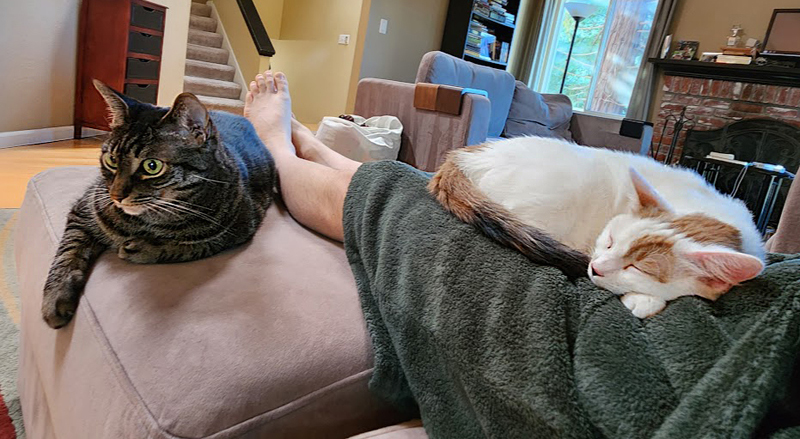Furry, fluffy or scaly, pets are good medicine

 (May 4, 2023) — In the United States, 70% of households have a pet kept for pleasure or companionship – a significant increase from 56% in 1988.
(May 4, 2023) — In the United States, 70% of households have a pet kept for pleasure or companionship – a significant increase from 56% in 1988.
Dogs lead the pack, with an estimated 69 million households having at least one. Roughly 45.3 million American households are crazy for cats, and 11.8 million enjoy freshwater fish.
A third of Millennials have pets, while 27% of Boomers and 24% of Gen Xers do as well. Gen Zers are most likely to have an exotic or less typical pet, such as a reptile, bird or rodent.
Nearly 40% of Americans prefer to adopt a pet from a shelter or rescue organization. But we all spend wildly on our furry, feathered or scaly friends: roughly $123.6 billion in 2021.
Pet owners extol the many benefits – physical, emotional and psychological – of sharing life with an animal, but what does the science have to say? The National Institute of Health (NIH) has spent the last 10 years examining potential health benefits of animal-human interaction and continues to gather research through ongoing studies.
“We’re trying to tap into the subjective quality of the relationship with the animal – that part of the bond that people feel – and how that translates into some of the health benefits,” explains Dr. James Griffin, a child development expert at NIH.
Mindfulness
Dr. Ann Berger, a physician and researcher at the NIH Clinical Center in Bethesda, Md., works with people facing terminal illness. She focuses on mindfulness to decrease stress and manage pain.
“The foundations of mindfulness include attention, intention, compassion and awareness,” she says. “All of those are things that animals bring to the table. People kind of have to learn it; animals do this innately.”
Interacting with pets has been shown to relieve depression and anxiety and promote healthier responses to stress. A recent survey by the Human Animal Bond Research Institute (HABRI) showed 90% of respondents reporting that a pet helped them “make it through the COVID pandemic,” a period that challenged mental health globally.
Regular exercise is also vital to good health, and dogs are the four-legged ambassadors of pedestrian pastimes. As a species, they possess a dogged commitment to walking. Dog owners walk an average of 22 minutes more per day than those without.
In addition, dogs promote more human interaction – with friendships often forming at dog parks. An estimated 40% of pet owners say their social support network is comprised primarily of people met through pet ownership.
Cat owners, meanwhile, know the delights of curling up with a purring kitty. The purr frequency is between 20 and 140 Hertz, which is proven to promote bone growth and healing, lower blood pressure and reduce stress. A 2009 study found cat ownership so beneficial to the cardiovascular system that it decreased the likelihood of death by heart attack.
Life lessons
Caring for animals is something to be enjoyed throughout the lifespan. Young people often have their first experience of providing care through interactions with pets or rescued wild animals.
Another study at NIH focused on teenagers diagnosed with Type 1 diabetes and compliance with blood glucose checks. Researchers gave a group of diabetic teens a pet fish. They instructed the teens to provide care twice a day and clean the tank weekly. This was paired with the subjects reviewing blood glucose logs with parents. In comparison with a control group who did not receive a fish, the teens were found to be significantly more diligent in checking and logging their blood glucose levels – an essential skill in managing diabetes.
Our society places such a premium on independence that it often forgets the importance of connection, warmth and touch. Thankfully, our furry, feathered, scaly and even slimy friends are here to help.
Please send comments and question to Nathalie at newwavenightingale@gmail.com

Nathalie Montijo
Nathalie Raven Archangel-Montijo holds a rather interesting array of degrees and certifications, including master’s in nursing and traditional Chinese medicine (TCM). She has post-master certification as an adult geriatric primary care nurse practitioner (AGPCNP) and a license to practice acupuncture in California (L.Ac). To round all that out, she is certified in infection prevention and control (CIC) and as an advanced certified Hospice and palliative care nurse (ACHPN).
She also performs in the outlaw country band, Nineteen Hand Horse.



